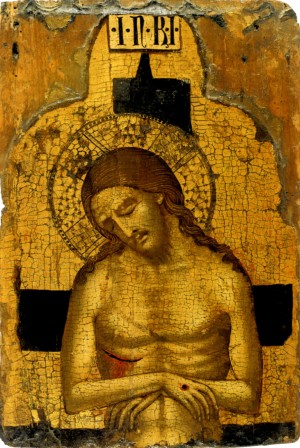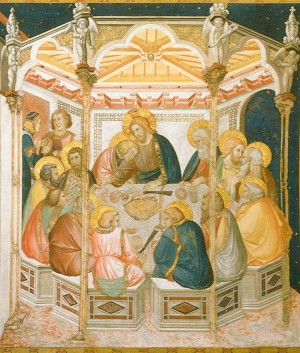As you would expect, Catholics believe it does.
Jesus said,
“There shall be one flock, one shepherd” (John 10:16).
So, we think there should be one, universal, apostolic church.
 Unfortunately, there is tremendous division among Christians and the division and segmentation is growing. In fact, conservative estimates put the number of Christian denominations worldwide in the tens of thousands!
Unfortunately, there is tremendous division among Christians and the division and segmentation is growing. In fact, conservative estimates put the number of Christian denominations worldwide in the tens of thousands!
The seeming hopelessness of discerning the one, true Church from this ever-expanding crowd has caused many to fall into indifference or “non-denominationalism,” which is the notion that one faith community is as good as another. Sadly, many of Christ’s followers today are of the opinion that differences in belief are ultimately irrelevant, which is a strain of the relativism that has contaminated secular society, too.
“All I have to do is love Jesus” has become the non-denominational movement’s unofficial motto. But how can one be sure he is loving Jesus in the right way—that is, on Jesus’ terms and not his own?
“If you love me,” says Jesus, “you will keep my commandments. … He who has my commandments and keeps them, he it is who loves me …” (see the Gospel of John 14:15 & 21, John’s First Letter, 5:3, or John’s Second Letter, 1:5-6 & 9). Obviously, then, what one believes (and how one acts) has a great deal to do with loving Jesus.1
 The concept of non-denominationalism—that Christian truth is relative—would never have occurred to the mind of the Apostolic Church, which placed great emphasis upon the doctrinal unity of her members. Paul, for instance, wrote in his First Letter to the Corinthians (Cor. 1:10), “I appeal to you, brethren, by the name of our Lord Jesus Christ, that all of you agree and that there be no dissensions among you, but that you be united in the same mind and the same judgment” (see Paul’s Letter to the Ephesians, too, 4:11-14).
The concept of non-denominationalism—that Christian truth is relative—would never have occurred to the mind of the Apostolic Church, which placed great emphasis upon the doctrinal unity of her members. Paul, for instance, wrote in his First Letter to the Corinthians (Cor. 1:10), “I appeal to you, brethren, by the name of our Lord Jesus Christ, that all of you agree and that there be no dissensions among you, but that you be united in the same mind and the same judgment” (see Paul’s Letter to the Ephesians, too, 4:11-14).
The grim reality of modern-day Christianity, however, is that the followers of Jesus are separated into a multitude of factions, which sharply disagree with one another on what the Lord actually taught.
The Bible tells us, for instance, that Jesus sent the Apostles out to “make disciples of all nations, baptizing them in the name of the Father and of the Son and of the Holy Spirit …” (Matt. 28:19). Yet, the spiritual descendants of those whom the Apostles first baptized disagree on the question of Baptism, its true significance, how it is to be carried out, and so on. In his Letter to the Ephesians (4:5), Saint Paul assures us there is “one faith, one baptism,” but can this honestly be said of Christianity today? As the introductory rite to Christian life, Baptism was intended to be a source of unity for believers. Ironically, along with almost every other tenetis a point of contention.
 At the Last Supper, Jesus prayed that His followers would be united, saying, “[May they] all be one; even as thou, Father, art in me, and I in thee, that they also may be in us, so that the world may believe that thou hast sent me” (John 17:21). Jesus does not desire a superficial oneness for His followers, but a complete oneness as He shares with the Father. Obviously, it is impossible to have such unity without unity of belief. Can one imagine, for instance, Jesus dissenting with the Father on the issue of Baptism; or saying, “It doesn’t matter what I and the Father believe, so long as we love each other”? Jesus intended the oneness of His followers to be the proof of His messiahship—“May they all be one … so that the world may believe that thou has sent me.” The scandal of Christian disunity has indeed been an impediment to non-Christians seeing the truth of the Gospel. The followers of Christ do share a certain unity in our profession of Jesus as God and Savior, but even this falls short of the full unity for which He prayed. For while we agree that Jesus is Our Savior, we fervently disagree on how exactly we are saved. Simply put, the notion that the oneness to which Jesus has called all believers exists today among tens of thousands of separate denominations is a fallacy.
At the Last Supper, Jesus prayed that His followers would be united, saying, “[May they] all be one; even as thou, Father, art in me, and I in thee, that they also may be in us, so that the world may believe that thou hast sent me” (John 17:21). Jesus does not desire a superficial oneness for His followers, but a complete oneness as He shares with the Father. Obviously, it is impossible to have such unity without unity of belief. Can one imagine, for instance, Jesus dissenting with the Father on the issue of Baptism; or saying, “It doesn’t matter what I and the Father believe, so long as we love each other”? Jesus intended the oneness of His followers to be the proof of His messiahship—“May they all be one … so that the world may believe that thou has sent me.” The scandal of Christian disunity has indeed been an impediment to non-Christians seeing the truth of the Gospel. The followers of Christ do share a certain unity in our profession of Jesus as God and Savior, but even this falls short of the full unity for which He prayed. For while we agree that Jesus is Our Savior, we fervently disagree on how exactly we are saved. Simply put, the notion that the oneness to which Jesus has called all believers exists today among tens of thousands of separate denominations is a fallacy.
The early Christians were united not merely in a communal sense, but in doctrine (cf. Acts 2:42). Referring to “the elementary doctrine of Christ,” the Letter to the Hebrews lists six religious teachings which apparently all newcomers to the Faith were expected to know (see 6:1-2). Throughout the New Testament Epistles believers are admonished to avoid deviating from the doctrine they have received from the Apostles (cf. Gal. 1:6-9; 2 Pet. 2:1; Jude 1:3, et al.). Even Paul, the great evangelist, humbly submitted himself to apostolic authority. After fourteen years, in fact, he was compelled “by revelation” to go to the Apostles in Jerusalem so that they might examine what he had been preaching, “lest somehow I should be running or had run in vain” (Gal. 2:1-2).
To say that the Catholic Church is one—that she alone has maintained the doctrinal unity which Christ willed for His flock—is not to suggest every individual Catholic throughout the world stands in complete agreement with every other. The Church is one by virtue of the fact that her bishops, the successors of the Apostles, stand perpetually united in doctrine with the Bishop of Rome (or the Pope), Saint Peter’s successor. So long as a Christian remains united in doctrine with the Roman Church he can rest assured he is likewise united in doctrine with the Apostles and with the One Who sent them (cf. Luke 10:16; John 13:20).2 The profound difference, then, between the division that exists in Catholicism and the division that exists within other Christian bodies, lies in the fact that Catholicism alone possesses the clearly defined, infallible authority of the Church to which the believer may go to determine if his personal views are in line with the Gospel (just as Saint Paul did in Galatians 2:2). In Protestantism, on the other hand, in which the rejection of ecclesiastical authority has itself become doctrine, each individual believer is his own ultimate authority in determining what to believe.
- “Even the heretics appear to have Christ, for none of them denies the name of Christ,” argued Saint Ambrose of Milan (d. 397); “yet, anyone who does not confess all that pertains to Christ does in fact deny Christ” (Commentary on Luke 6:101; cf. 2 John 1:9).
Dr. Donald DeMarco, co-author of Architects of the Culture of Death (with Benjamin D. Wiker, San Francisco: Ignatius Press, 2004), offered the following insight in a radio interview:
“Those people who believe in God are willing to believe and understand and accept that God is a God of love. But not enough are willing to understand and accept that God is also a God of truth. In God, everything is unified: God is a God of love and He is also a God of truth. God has a heart, so to speak, and He also has a mind. … Now, what happens when we think of God solely in terms of love and we deny the truth element is that love degenerates into sentimentality. And sentimentality is like a wet rag, it doesn’t have much substance. Then we don’t really have much discernment by which we can distinguish what is good from what is evil. We kind of go by these sentimental feelings and, like Jean-Jacques Rousseau, we begin to think that everything is good. And, of course, this gets us into great difficulty. (Truth) strengthens love, so that love doesn’t degenerate into sentimentality and so that God offers us nourishment for our heart as well as for our mind. … The truth element of God is just as important as the love element” (Catholic Answers LIVE radio program, April 8, 2005). ↩
- Rome’s primacy among the Churches has been a constant in Christianity from the first century forward, as demonstrated in the writings of Pope Saint Clement and Saint Ignatius of Antioch, who knew the Apostles, and Saint Irenaeus of Lyons, who learned from one who had known them (see Clement: Letter to the Corinthians 1:1; 5:1-7; 58:2; 59:1; 63:2; Ignatius: Romans, Address; 3:1; 4:3; Irenaeus: Heresies 3:1:1; 3:3:2-3). ↩